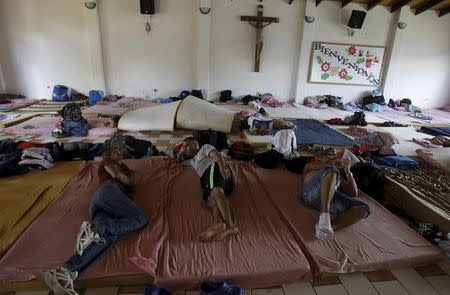Migrant crisis hangs over Costa Rican president's visit to Cuba

By Marc Frank HAVANA (Reuters) - Costa Rican President Luis Guillermo Solis arrived in Cuba on Sunday with plans to increase trade overshadowed by what to do with nearly 5,000 Cuban migrants stranded in his country. The Cubans began arriving a month ago on their dangerous 7,000-km (4,400-mile) overland trek from Ecuador to the Mexican-U.S. border, where Cubans are given legal passage into the United States. In brief comments to reporters on his arrival, Solis, holding a small Cuban flag, said his trip was meant to complete Costa Rica's normalization with Cuba, extend his country's outreach to the Caribbean and promote trade. When a reporter asked about the migrants, Solis responded, "That will be one of the topics on the agenda." The visit was planned well before the crisis. Costa Rica re-established relations with Cuba in 2009, the last country in Latin America to do so. When the United States reached detente with Cuba a year ago, it led to a spike in Cuban emigration, partly due to fears the Americans would end the special treatment that grants them residence with relative ease. The issue reached crisis proportions when Costa Rica broke up a gang of human smugglers, leaving the Cubans in the lurch. Costa Rica closed its border after arresting the smugglers, then granted the Cubans temporary visas to pass through. But Nicaragua, a country further to the north, refused to follow suit, leaving Costa Rica with an ever growing number of migrants. Nearly 5,000 are stuck in shelters on the border and an estimated 1,300 to 1,500 are held up in Panama, one country to the south, attempting to move into Costa Rica. The crisis, now termed a humanitarian one by Solis, is sure to top the agenda when he meets with President Raul Castro on Tuesday. Cuba has repeatedly blamed the United States' Cold War-era immigration policy for enticing its citizens to risk their lives and fostering human smuggling. Solis has promised not to deport the Cubans and to continue looking for a way to get them to the United States. Some 43,159 Cubans entered the United States without visas in fiscal year 2015, up 78 percent from 2014 and up 550 percent from 2011, according to a Pew Research Center report based on U.S. government data. Many begin by flying to Ecuador, which prides itself on open borders. But Ecuador imposed a visa requirement on Cubans this month in hopes of slowing the flow. (Reporting by Marc Frank; Editing by Daniel Trotta and Jonathan Oatis)

